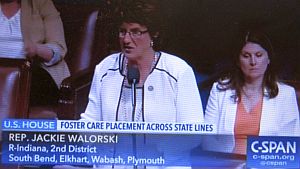 WASHINGTON – U.S. Representative Jackie Walorski (R-Ind.) Wednesday applauded the unanimous House passage of her bipartisan legislation to speed up the process of placing children with foster families in other states. The Modernizing the Interstate Placement of Children in Foster Care Act (H.R. 2742), which Walorski introduced last month with Rep. Danny Davis (D-Ill.), would help states move to an electronic system for interstate foster care placement in order to reduce the delays and costs of paperwork. It passed the House by voice vote.
WASHINGTON – U.S. Representative Jackie Walorski (R-Ind.) Wednesday applauded the unanimous House passage of her bipartisan legislation to speed up the process of placing children with foster families in other states. The Modernizing the Interstate Placement of Children in Foster Care Act (H.R. 2742), which Walorski introduced last month with Rep. Danny Davis (D-Ill.), would help states move to an electronic system for interstate foster care placement in order to reduce the delays and costs of paperwork. It passed the House by voice vote.
“The faster we can place vulnerable children in stable homes through foster care and adoption, the better chance they will have to thrive and succeed,” Congresswoman Walorski said. “Printing and mailing back and forth hundreds of pages of paperwork only forces kids to wait longer to be with loving families. By eliminating this unnecessary paperwork and building on the success Indiana and other states have had with a modern, electronic system, this bipartisan bill will reduce excessive delays and help children lead better lives.”
“The NEICE system is going to be invaluable in helping both the public and private sector child welfare agencies reduce considerably the length of time a child [needs] to wait for a ‘forever family,’” said Sharon Pierce, President and CEO of The Villages of Indiana, the largest nonprofit child and family services provider in Indiana.
BACKGROUND
Most states currently use paper systems for the interstate foster care placement process, requiring state caseworkers to print and mail hundreds of pages of paperwork to place a foster child in a home across state lines, including with a grandparent or other relative. This outdated process can take an average of more than five months to complete.
Five states, including Indiana, and the District of Columbia in November 2013 launched the National Electronic Interstate Compact Enterprise (NEICE) as a pilot project. This cloud-based electronic system reduced wait times by 30 percent on average. Another seven states, including Illinois, have since joined the NEICE system.
The Modernizing the Interstate Placement of Children in Foster Care Act would require states to join the NEICE system by 2027 and would authorize $5 million in funding to help states transition to or expand their use of the NEICE system for interstate foster care placement.
U.S. Senators Todd Young (R-Ind.), Kirsten Gillibrand (D-N.Y.), and Chuck Grassley (R-Iowa) introduced companion legislation in the Senate.
Supporters of the legislation include the American Academy of Adoption Attorneys/American Academy of Assisted Reproductive Technology Attorneys; American Academy of Pediatrics; American Congress of Obstetricians and Gynecologists; American Public Human Services Association; California County Welfare Directors Association; Child Advocates in Indianapolis, Ind.; March of Dimes; National Association of Counties; National Association of Pediatric Nurse Practitioners; Partnership for Strong Families; The Villages of Indiana; and Voice for Adoption.
Video of Walorski speaking on the House floor in support of the legislation is available here. The full text of her remarks is below.
“Thank you, Mr. Speaker. I rise today in support of my bill, H.R. 2742, the Modernizing the Interstate Placement of Children in Foster Care and Adoption Act, which I introduced along with my friend from Illinois, Mr. Davis.
“We know full well the importance of a stable home environment for a child’s development and success later in life. Unfortunately, we don’t live in an ideal world. We have seen too many instances when abuse, neglect, physical or mental illness, addiction, incarceration, or death necessitates removing a child from their home.
“Right now, in my home state of Indiana, there are 10,000 more children in the foster care system than there were 18 months ago. This is due in large part to the opioid epidemic that has swept across our country. Our child welfare system is under unprecedented strain.
“And yet, in spite of this great need for foster care and adoption, if a child needs to be placed in another state, caseworkers from both states must literally print and fill out hundreds of pages of paperwork and mail them back and forth. This cumbersome process takes months, and just one missing page can set it back even further. These are precious months that an at-risk child is stuck in limbo, waiting for the certainty of a more permanent home. It’s time to bring this process into the 21st century.
“Luckily, there is an effort already underway to do just that. In November 2013, five states, including my home state of Indiana, and the District of Columbia launched the National Electronic Interstate Compact Enterprise, or NEICE. NEICE is a cloud-based electronic system that allows for the electronic exchange of data between states. It started as a pilot project, but the results have been crystal clear: placement wait times dropped by a month and a half, states spent less money on copying and mailing, and caseworkers saved valuable time.
“NEICE is now active in 16 states, including Mr. Davis’ home state of Illinois, but we can’t stop at 16. As it stands today, if a child in my district in South Bend, Indiana, needed to be placed with their grandparents just 11 miles away in Niles, Michigan, the two states would still have to undertake that arduous paperwork process because Michigan is not a part of NEICE yet. All states need to be a part of this system in order to realize its full benefits.
“That’s where the bill before us comes in. H.R. 2742 represents a very important investment in the future of at-risk youth. It requires states to join the NEICE system by October 1, 2027, and sets aside $5 million in existing federal funds to facilitate states in joining or expanding services under NEICE. That money doesn’t come without strings. States must apply for funds and submit detailed plans. The Secretary of Health and Human Services will have to submit periodic reports to Congress so that we can monitor progress as states join and ensure that NEICE continues to cut wait times for children and administrative costs for states.
“In the 114th Congress, this legislation passed the House of Representatives, but unfortunately did not come up for a vote in the Senate. It is our hope that we can cross the finish line this year and help at-risk youth find their forever home more quickly. I want to thank the gentleman from Illinois, Mr. Davis, for being a great partner in introducing this legislation. I’d also like to thank Senators Young, Grassley, and Gillibrand for introducing companion legislation in the Senate. Finally, I’d like to submit for the record a list of the 17 organizations that wrote in support of H.R. 2742. …
“I want to close with the words from someone on the ground, living this every day. Sharon Pierce is the President and CEO of The Villages of Indiana, the largest nonprofit child and family services provider in Indiana, and a supporter of H.R. 2742. “The NEICE system,” she says, “is going to be invaluable in helping both the public and private sector child welfare agencies reduce considerably the length of time a child [needs] to wait for a ‘forever family.’”
“This isn’t just a good government bill, Mr. Speaker. Sure, we’re reducing costs and paperwork and we can attach all sorts of numbers and dollar figures to that. But the most important thing we’re doing, the most invaluable part of this bill is the time. We’re giving at-risk youth a more permanent home sooner. We’re giving them hope sooner. We’re giving them a chance to thrive sooner.
“I urge my colleagues to vote yes and I yield back the remainder of my time.”
Walorski represents the 2nd Congressional District of Indiana, serving as a member of the House Ways and Means Committee.














